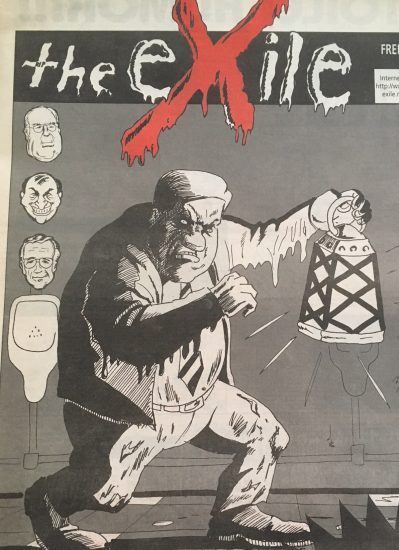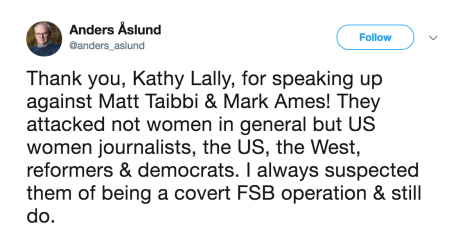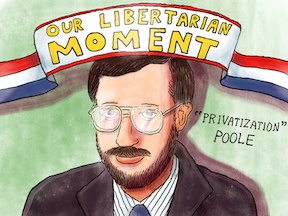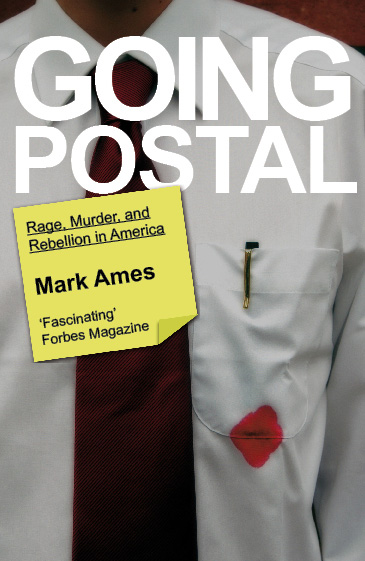
I finally read Kathy Lally’s rambling screed. How do you respond to something so blatantly dishonest? A number of media contacts have told me that Lally shopped this hit piece around to multiple publications, but it was rejected for this very reason. According to JPMorgan whistleblower Alayne Fleischmann, the Huffington Post is one such publication that rejected the piece, but I have been told that there were more. It waits to be seen why Jeff Bezos’ Washington Post ran such a deliberately deceptive smear piece.
For one thing, Lally claims that The eXile’s satire “terrorized women correspondents in Moscow” — without mentioning a single male “victim” of our vicious satire and pranks, even though most of The eXile’s “victims” or targets were male (as were most foreign correspondents in Moscow at that time). Compared to what The eXile did to male western hacks, Lally got off light. Just ask the New York Times’ Michael Wines, who got a horse sperm pie tossed in his face after The eXile awarded him the worst Moscow hack for his series of articles whitewashing Vladimir Putin and his KGB past. Mention the fact that most of The eXile’s targets were male, and Lally’s grossly opportunistic thesis falls apart. No wonder she omitted it.
Lally was never a major concern of ours, apart from her effort to get us censored (and worse). Before Lally tried to get the entire eXile publication censored from the all-important and influential Johnsons Russia List email list, described in a 1997 New York Times article as the one centralized space where “Russia Watchers Watch Each Other”, she barely registered on our radar, and hadn’t appeared in our publication. The eXile published a lot of deliberately offensive satire, and a lot of embarrassing stupid and juvenile satire. It also published a lot of brilliant satire, investigative journalism, and criticism. We were trying to create a genuinely transgressive left that spared no one and nothing, and we deliberately took it too far, sometimes with great results, sometimes not. But the idea that, just a few years after the fall of the Soviet Union, an American journalist — a veritable missionary for democracy, as every American in Moscow pretended to be in the 1990s — would post an open letter in the JRL asking for the moderator to censor everything from an American publication, even the non-satirical/non-offensive criticism and investigative journalism about Russia, simply because other eXile material not posted in the JRL offended Lally, was outrageously hypocritical and unprincipled. No American journalist should want to censor journalism in a place like Russia, with its history.
The moderator of the Russia list held an open poll/discussion about running Taibbi’s press review columns, and nearly all of Lally’s media colleagues openly opposed her position—both female and male. One of the most persuasive voices defending The eXile from censorship came from Masha Gessen. That’s despite the fact that our paper had savagely mocked and heckled Gessen, the sort of mockery that Kathy Lally now claims puts her on par with #MeToo victims of rape and sexual assault. Ever since then, I’ve always admired Gessen for her principled positions and her willingness to stick her neck out, even though I often disagree with her.
In the end, after dozens of reporters, academics, ex-diplomats and other Russia watchers weighed in, Lally’s attempts to have us censored failed.
Like I said, I hadn’t heard of Lally before she tried to have us censored. Her reporting differed little from the rest of the foreign hack herd — mostly a smug clique of pampered cheerleaders for Yeltsin’s corrupt “young reformers” and whatever toxic neoliberal medicine the Clinton Administration force-fed Russia.
At the time, our satirical fire was trained on the biggest and most insidious Yeltsin-apologist hacks—Fred Hiatt of the Washington Post (who failed up to the WaPo’s editorial page, where he famously published 27 WaPo editorials promoting Bush’s invasion of Iraq and the deaths of a million Iraqis), Michael Gordon of the New York Times (who published fake Iraq WMD articles co-bylined with Judith Miller, articles used to justify the invasion of Iraq), Geoff Winestock of the Moscow Times, Carol Williams of the Los Angeles Times, Steve Liesman of the Wall Street Journal. And of course Michael McFaul, the Clinton Administration’s neoliberal kommissar in Moscow, whose job was to cheer on and whitewash Yeltsin’s catastrophic Washington-backed policies and make sure the foreign hacks kept in line with his bosses in Washington, despite the fact that these policies so profoundly destroyed Russia’s economy and its people’s lives that they made the nationalist Putin backlash a certainty. (Today McFaul is partnered with neocons like William Kristol running a paranoid Russiagate boondoggle—a fitting career choice.)
It seemed so strange to us that an American journalist in post-Soviet Russia would publicly call for a total ban on an American publication. Something wasn’t right with Lally. So we concocted a prank that would test how far she’d be willing to betray basic American journalism principles — commitment to free speech, protection of offensive free speech, journalists and authors. An American friend in Moscow, a student from a top American university, agreed to call up Lally and see if she’d support a boycott of The eXile. We also wanted to see if she’d agree to something so completely outrageous that there was no possible way she would fall for it — agree to assisting a former branch of the KGB known as FAPSI in opening a criminal investigation against The eXile, me and Taibbi, for incitement to hatred. (Nine years later, another Kremlin agency now known as Roskomnadzor shut The eXile down and chased me out for real based on almost identical charges that we used in our Lally prank. You can read the Committee To Protect Journalism’s report on the Kremlin attack against The eXile here. This was a big international news story at the time. But by some amazing journalism feat Lally managed to write thousands of words on The eXile without mentioning the most famous and widely-reported episode of all—the Kremlin shutting us down in 2008, for the same reasons that Lally wanted us censored. Hard to play the victim of “terror” when you’re aligned with Putin’s media crackdown goons, so like so much else in her deceptive screed, Lally simply deleted this rather important episode.)
To understand the type of reporting Lally was doing at that time, you need to get a bit more context, because it’s still wildly underreported and little understood (thanks largely to the foreign press corps). At that time, Russia had already suffered a roughly 50% collapse in its GDP and was now on the verge of falling over the final cliff into total insolvency. Russia in the 1990s suffered the deepest and deadliest peacetime economic depression of the century. An estimated three to six million Russians met what are called “excess deaths”. Paul Klebnikov — the American Forbes editor who was assassinated in Moscow in 2005 — described Russia’s rampant poverty and social collapse from 1992-98 as “a catastrophe without precedent in modern history—the only parallel was with countries destroyed by war, genocide, or famine.” Klebnikov continued:
“Each month thousands of Russians were dying prematurely. Such a drop in life expectancy, labeled ‘excess deaths,’ has always been a standard algorithm in demographers’ calculations of the death toll of the great disasters—whether Stalin’s collectivization in the 1930s, Pol Pot’s rule in Cambodia in the 1970s, or the famine in Ethiopia in the 1980s. American demographer Nicholas Eberstadt estimated that the number of ‘excess deaths’ in Russia between 1992 and 1998 was as high as 3 million. By contrast, Eberstadt observed, Russia’s losses in World War 1 were 1.7 million deaths.”
It was this atrocity, fully organized, advised and funded by the Clinton Administration, and whitewashed by western hacks like Lally, that The eXile covered in all its savagery, which we met with literary savagery.
The same week that I ran an article in The eXile correctly predicting the total collapse of Russia’s economy — the first such English-language article laying out the full inevitable scenario of Russia’s neoliberal collapse —Lally came out with an article with this lede:
“With the ruble strengthening and stock prices rising yesterday, the latest Russian economic crisis began to subside. Ordinary citizens returned to what they do best — persevering and hoping for the best.”
As Taibbi wrote at the time, Lally’s article also came out just as a nationwide miner’s strike ended over months or years worth of unpaid wages and appallingly deadly workplace conditions: “That was Lally’s take on the miners—that ‘what they do best’ is ‘persevering and hoping for the best’ had already won them a year of unpaid labor in the world’s most treacherous hellholes. The article might as well have been headlined, ‘Hey Miners: Eat Shit and Like It!’”
For decades now I’ve been hearing about Walter Duranty’s whitewashing of the Stalin-era famine as the ultimate in journalism malpractice—but those same people who sanctimoniously trash Duranty are oddly silent about the dozens of contemporary Durantys who whitewashed the millions of Russian “excess deaths” that went on right before their eyes during Yeltsin’s reign. If Lally had her way, my article on Russia’s imminent collapse, the only such article at its time, would’ve been censored from Johnsons Russia list and the thousands of narrative-shaping subscribers—in favor of the sort of callous propaganda Lally and her clique were producing.
Getting back to the eXile prank—as it turned out, we were actually shocked by what Lally was willing to do. We figured she might be loathsome enough to agree to the boycott, as bad as that was, but that she’d surely hang up the phone as soon as our caller proposed to Lally a meeting with the former KGB surveillance agency. Here is the transcript of the call made by the American woman who worked with us.
eXile: May I speak to Kathy Lally please?
Lally: This is she.
eXile: Hi, Mrs. Lally, my name is Wendy Helleman, an I’m calling because I’m part of a group that is working to close down the eXile newspaper. I read your name on the Johnson’s List, where my husband published a critique of the eXile, and I thought I’d try to enlist your support.
Lally: I completely sympathize with you. Frankly, I wish they’d just go away. That…the newspaper is an awful thing, they give the Western press a bad name. What they publish is just dreadful!
eXile: Well, that’s why we’re working to get them closed down. We’re sort of working on doing a two-front approach. One is that we’re try9ing to organize a boycott, and the other is that I’m working with some officials from FAPSI [the ex-KGB surveillance agency that snoops on everyone’s communications, equivalent to the NSA] and they said that they could go ahead and press charges against the editors under article 117 of the criminal code, but that they’d need three experts for what they call ‘independent opinions.’ Since I saw your piece on the Johnson’s List, I thought you might be willing to help us out and appear as an expert witness for FAPSI’s case.
Lally: H’m. I’ll have to think about it. I’m not sure how my newspaper would feel about it if I acted in such a role, but I certainly do sympathize with you.
eXile: Well, if not, would you be willing to participate in an organized boycott of the newspaper? We’re going to start by boycotting the eXile’s advertisers and distribution points to force people not to carry or sponsor the newspaper.
Lally: You know, I’ve spoken to someone about that—I’ve personally thought about calling advertisers myself. Although I don’t read the newspaper myself [!], I have heard that they used my name as a phony byline in an article last week. I’m outraged…As for participating in the FAPSI investigation, what exactly would one need to become an ‘expert’ or offer an ‘independent opinion’? What do I need to do, exactly?
eXile: They just need an independent opinion, you know, to get another Western journalist to testify on the language, since it’s in English. We’re trying to convince them that the eXile broke the criminal code which bans literature that incites hatred or violence. [Note: this is roughly the same law later used by the Putin regime to close The eXile and chase me out of the country.]
Lally: Well, I’ll think about it. Please call me tomorrow.
After we published this in The eXile, Lally went after us like a corrupt and vengeful cop. She contacted several American journalists asking bizarre questions about us, claiming it was all information she planned to use in an article about us. That would be fine, but the information she was fishing for was cop-menacing. The editor of the St. Petersburg Times (and soon to be editor of the Moscow Times) frantically got in touch with Taibbi to tell him that Lally had asked him such bizarre menacing questions as “what type of visas eXile employees use” to stay in Russia, and “which of the anti-Chubais oligarchs do you think might be financing them?” [The eXile was the only English-language media critical of Chubais, the most hated figure in Russia, for overseeing Russia’s catastrophic privatization program that created the oligarchy and impoverished nearly everyone else—for this, Chubais was the darling of the western press corps and the Clinton Administration]. Asking about our visas was particularly menacing — it’d be like threatening to report unruly foreign journalists to Trump’s ICE.
In her WaPo hit piece, Lally describes her grotesquely threatening actions this way:
“Taibbi had accused a friend of mine of being paid by Russian oligarchs to write favorable stories, so I thought it was worth asking about the eXile’s connections.”
It’s interesting that Lally and her WaPo editors chose not to disclose the name of “this friend of mine” because that “friend” happens to be Fred Hiatt—the Washington Post’s powerful editorial page editor. Now you start to see why the Washington Post agreed to run a story that was rejected in so many other venues. The vengeful sleaze runs deep.
Back in 1998, Hiatt worked as a WaPo correspondent in Moscow, where he published a shameless PR fluff piece on the billionaire oligarch closest to the former KGB, Vladimir Potanin — one of the only Yeltsin oligarchs to survive through the Vladimir Putin years. Hiatt’s Washington Post article lovingly described Potanin as a “baby billionaire” who “metamorphosed” by some magical process “into one of world’s most influential businessmen” — without mentioning that Potanin got rich by concocting the notorious “loans-for-shares” privatization program, appointing himself Yeltsin’s Finance Minister, then arranging rigged auctions for hugely valuable assets, turning him into a “baby billionaire”—and everyone else in Russia into a dying pauper. So Taibbi asked Hiatt if he had been paid to write that, because there was no other rational explanation we could find. We accompanied that with a prank in which we posed as Potanin calling the Washington Wizards for courtside seats, Harvard University business school to purchase a degree, and the Augusta National Golf Club—brandishing Hiatt’s article for access:

eXile: I am Russian banker, so-called robber baron capitalist, am interested in purchasing your degree.
Harvard: (pause) Uh, sir, you can’t buy the degree, but you can enroll in our program. It’s an intensive 9 week program, and you receive a certificate, not a degree.
eXile: No, this is no good. Do you realize who I am? Fred Hiatt wrote about me in today Washington Post, that I am not typical robber baron. I am ze baby billionaire.
Harvard: We read a lot about Russia and it sounds very exciting.
eXile: Of course it exciting. Now I vant Harvard degree.
Harvard: You can’t buy a degree.
eXile: Maybe instead I build nice cafe for you on campus. Or I can donate small nightclub for Harvard degree.
Harvard: Sir, Harvard is a 350-year-old institution. It’s not all just about money. We’ve turned down princes.
eXile: NOT ABOUT MONEY? Hah!
By Lally’s own account, it was to avenge WaPo editor Fred Hiatt’s honor that she investigated our visa status and “which anti-Chubais oligarch” allegedly funded us — not to avenge her own shame for trying to get us censored and potentially locked up. But she (and her Washington Post editors) made a strategic decision not to mention Fred’s name—because he’s male and that would undermine the thesis of her smear; and because he’s a senior Washington Post editor, and this would suggest to readers something sleazier about the WaPo’s motive for running this hit piece. Omitting this is just another in a series of Lally’s deceptions. This also begins to answer the question: “Why did the Washington Post run an obviously fraudulent hit piece that other media outlets rejected?”
Returning to what happened that weird week of Lally’s cop-vengeance, she did something even more shocking. She got her reporter-husband, Will Englund—who had been jailed by the Russian ex-KGB security services just a few years earlier for reporting on Russia’s chemical weapons program — call Taibbi’s dad in New York, where he worked for NBC. Lally’s husband left a message on Taibbi’s dad’s answering machine that began, “Mike, hi, this is Will Englund. I just thought I’d give you a call… I’m in town to pick up my Pulitzer Prize. I just thought I’d let you know that your son has been harassing my wife to a degree that borders on stalking. I’d like to speak with you about it . . .”
You can’t exaggerate how much pedigree means to these people, but there it is. Pedigree, and proper manners: The twin pillars of the Establishment media faith.
Taibbi’s father eventually called Lally’s husband back. He told Lally’s husband that it was “ironic, to say the least, that his wife would talk about working with something like FAPSI to close [The eXile] down,” and advised him to call Matt himself. “I asked him—what the hell did he want me to do, take away [Matt’s] lunch money?”
Lally’s 2017 article tries hard to obfuscate and dissemble her shameful behavior in her efforts to censor us, and how she responded to that prank. Whereas Lally omits crucial details to build a false case — that most of our targets were male reporters, that the Putin regime eventually shuttered The eXile for the very satire she objected to — her attempts to explain why she agreed to help the ex-KGB agency FAPSI against two American journalists, and why she agreed to a boycott, read like a ten-car pileup of contradictions, half-confessions and non sequiturs. Lally claims she doesn’t remember what happened 20 years ago, but she reports remembering a crackling Russian phone line. She owns up to admitting that she’d never heard of the largest of all the ex-KGB agencies, FAPSI, at the time with an estimated 120,000 employees involved in snooping on journalists like Lally, who it now appears was blissfully unaware of that fact. She says the transcript “didn’t sound at all like me” but then contradicts herself, saying, “I don’t remember my words 20 years ago.” In other words, she doesn’t remember saying anything, but she remembers the “crackling Russian phone line” as well as the “tone” of her voice in that conversation. She’d’ve been better off just taking the Fifth on this.
The most stunning part of her explanation, and again I can’t believe an editor wouldn’t flag this, was when she tried excusing her failure to know what FAPSI was or to make out what our eXile caller was asking because, “We got so many odd calls as the [Moscow] bureau, some from the mentally ill, some from those with serious grievances, some from people with mysterious motives.” In other words, Lally wants her readers to believe that all sorts of homeless, mentally ill American women called the Baltimore Sun’s Moscow bureau office all hours of the day, so often that Lally could no longer tell the crazies from articulate educated American women identifying themselves as members of the Johnsons Russia List community.
Lally concludes: “I don’t remember my words of 20 years ago — I made an effort to forget the eXile and its editors — but I never had any intention of organizing a boycott.”
She doesn’t remember, she forgot all about us, but if she did agree to organize a boycott, she certainly didn’t intend to.
Something tells me that Lally wanted to flatly deny it and thereby lie, but she wasn’t able to convince even her own editors, whose necks are on the line if they let her get away with lying. Whatever the case, Lally owes us and all journalists here and in Russia a giant apology for betraying the most basic principles of the profession.
But it’s the larger point that Lally tries to make which is so problematic. There are a lot of things the eXile can and rightly should be trashed for today. People don’t live in the context of the 1990s Yeltsin catastrophe — except in the sense that we’re still dealing with the blowback from our role in ruling over Russia’s national tragedy, especially if you believe that our shitlord Trump was installed by vengeful Russians — so it’s hard to fault people encountering eXile’s gross, aggressive and transgressive satire for the first time in 2017, in America, for being offended. You’ll never understand the way we wrote unless you understand the indifference, amounting in many cases to outright gloating, with which American mainstream journalists reacted to the horrors of 1990s Russia.
But Lally’s article goes much further: She equates having her feelings hurt by a satirical rag that she tried to censor and even set up for a Russian cop arrest — to #MeToo victims of rape, sexual assault and sexual harassment. That is, to put it mildly, quite an opportunistic stretch. Lally admits she forgot about us “for years.” She writes that although the heckling satire made her “angry and upset” at the time (as vicious satire tends to), nevertheless “my self-esteem remained intact and my life moved along.” This is the very opposite of the sorts of permanent, raw emotional wounds and life scars that #MeToo victims have been airing out since the Weinstein story broke. By admitting this, Lally reveals herself as a vengeful and unprincipled hack who wants belated payback for being publicly embarrassed about her willingness to censor journalists and subject them to a Russian state goon stomping.
I was wondering if I’d written anything about Lally myself—most if not all the Lally material had been written by Taibbi, most of it great and funny, some of it —especially the “fat ankles” stuff — deeply embarrasing. Not that I didn’t write far more offensive shit myself, it’s just a matter of taste. I’m a black humor/offensive-satire snob, and those “fat ankles” descriptions come off as lazy jock jokes, and shift sympathy back to the real perpetrator of this ugly episode for no good literary reason. Lally had all the power in that dynamic — a credentialed pedigreed member of the official American journalism guild — and she crudely wielded that power to have us completely excluded. That is the story, and that’s the one point where the satirical approach to that story was weakened.

Anders Aslund was the top western advisor on Yeltsin’s catastrophic “shock therapy” program and a frequent eXile target. His McCarthyist tweet sums up their sleazy alliance
Anyway, I’d forgotten that I did write a critical piece on Lally’s hack journalism back in early 1999 — nearly a year after the censorship/FAPSI scandal. This was the very nadir of the Yeltsin decade, post-collapse, when Russia declared itself bankrupt and unable to meet its obligations. Mass unemployment followed, and for the first time in perhaps a century, some one-third of the population had to survive on subsistence farming to eat, growing potatoes and cucumbers and whatever else would grow in their dacha plots or on their balconies.
Here I’ll quote from Lally’s article, then my response.
First, Lally’s stunning display of crude orientalism towards Russians at their lowest point, falsely describing their flu remedies in ways that made them look like backwards savages. This crude characterization of Russians became a necessary trope for an American audience that didn’t want to take responsibility for the horrors of the 1990s when Russia was essentially a colony of the Clinton White House. Rather than take blame ourselves for helping destroy and depopulate Russia, articles making Russians look like hopelessly primitive savages redirected that blame back onto the colonized. It’s their fault we couldn’t civilize them with our shock therapy medicine—they’re too hopelessly backwards, in spite of our wonderful intentions.
Headlined “Moscow’s flu war means breathtaking measures. There’s no holding back garlic, onions, dirty socks, cognac” — Lally’s absolutely non-satirical piece smugly describes Russians “hanging dirty socks around the neck…rubbing the soles of the feet with the juice of a raw onion every night” and other barbarian home remedies. Here’s a taste:
Sasha Fominikh, a driver at a Moscow factory, read a newspaper article the other day that suggested hanging a pair of dirty socks around the neck. He decided against that, but when he felt a cold coming on, he tried out a second method — rubbing the soles of the feet with the juice of a raw onion every night before going to bed.
“It makes the feet sweat a lot,” Fominikh says, “which helps get rid of the fever.” He also drinks a little cognac and some tea with jam to prevent a cold from developing into something worse.
At the first sign of a sore throat, housewife Lena Slivkina starts to rinse her throat with cognac at least three times a day. “I don’t swallow it, by the way” she says.
“If I have a bad cough, I boil oats in milk for two hours and then drink it three times a day. Three days and no cough.”
Zina Basova, a street sweeper, eats garlic all year round. “If I still get the flu,” she says, “I use a lot of honey with tea.”
I responded to Lally’s journalistic atrocity by going to my local pharmacy in Moscow, asking the pharmacists if any of it was true, and then writing it up. Heres some of what I wrote at the time:
You almost wonder, after reading Lally’s article, whether Russians have yet developed a complex set of language skills or the ability to create fire. I for one decided to check.
So I went down to the closest Apteka, or pharmacy, on my street corner. I asked one of the pharmacists there, Lyubov Luskutova, if drinking cognac or smelling old socks or rubbing onions on your feet is the best way to overcome the flu epidemic that threatens all of us here. Surprisingly, the native spoke in an intelligible language, expressing a dazzling variety of emotions–such as bewilderment and confused laughter. She said she’d never in her life heard of rubbing onions on feet or snorting dirty socks in order to ward off the flu. She works in a pharmacy–yes, that’s right, Russians actually have pharmacies. And at pharmacies, they sell medicines.
So just to set Lally’s Baltimore-area readers straight, I’d like to note that the most common medicines to fight flus and colds sold here at my local apteka (and at the zillions of apteky in Moscow, including in nearly every metro station and every street block) are Tylenol flu medicine, Coldrex, Coldrex Nite, TheraFlu Tylenol for kids, and Lorane. For sore throats, most buy either Strepsils or Hall’s mints. The prices are high in ruble terms–Lorane costs 74 rubles a bottle, or about 3 dollars. But Luskutova assured me that sales aren’t noticeably down from last year’s flu season period. “People have to live,” she said just this morning. I’d personally doubt that sales are as stable as she thinks, but I will definitely take her word over Lally’s.
Other popular remedies for the flu are staying home from work and sleeping, drinking tea with honey, and drinking juice. Maybe these things weren’t wacky enough to fit into Lally’s “see how savage the Russians are” piece. Imagine the honest lead: “Russians are preparing for the onslaught of flu by buying Tylenol and Theraflu medicines from their local pharmacies.” Naw, it wouldn’t sell, as they say in Hollywood. Doesn’t make them seem savage enough.
Russians thankfully don’t stoop to mocking stories about how we Americans drop billions a year on totally useless vitamin supplements just because some quack named Linus Pauling told us to do so, and won a big ol’ award for it. Which gets to the point: THERE IS NO CURE FOR THE FLU! Duh!
I wrote this response because it seems that the old colonialist attitude is seeping back into the Western journalist narrative as never before. [Up until Russia’s 1998 financial collapse] at least you had two narratives: good reformers versus savage old commies; or, see how much better we are than the Russians. Now… readers back home are left with only one narrative: how many ways can you paint a Russian as a savage. . . . As Jean MacKenzie wrote in a November 24th, 1998 installment of her Moscow Times column, “Confessions of a Russophile”: “the last vestiges of the light [in] this dark, savage country are slowly dying out.”
That’s right: even Moscow’s self-proclaimed Russophile openly refers to Russia as “this dark, savage country.” …
You see? Lally’s gloating, smug colonialist triumphalism was the norm in expat circles. That was what we were fighting. And sometimes the outrage got out of control. But it’s beyond grotesque that our outrage should be picked over for language crimes by a sloppy, inept, conscience-free writer like Lally. When the crimes of Western journalists during the Yeltsin era are chronicled, I kinda think it’ll be the callous triumphalism with which she and her Clintonite buddies watched millions of Russians die that are condemned–not the tonal lapses of a low-budget dissident rag like eXile, shaking its puny fist at this corruption.
Posted on: December 18th, 2017 | Comments (9)






















